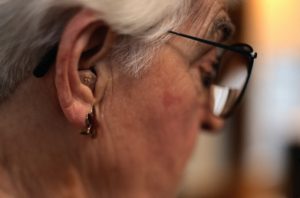 Hearing loss in elderly is linked to brain atrophy, according to the study findings. The researchers detected accelerating gray matter atrophy in auditory areas of the brain in patients with mild hearing loss. Declining hearing ability also meant an increase in the listening effort in seniors for more effective speech comprehension.
Hearing loss in elderly is linked to brain atrophy, according to the study findings. The researchers detected accelerating gray matter atrophy in auditory areas of the brain in patients with mild hearing loss. Declining hearing ability also meant an increase in the listening effort in seniors for more effective speech comprehension.
Lead author Dr. Jonathon Peelle explained, “As hearing ability declines with age, interventions such as hearing aids should be considered not only to improve hearing but to preserve the brain. People hear differently, and those with even moderate hearing loss may have to work harder to understand complex sentences.”
Advertisement
The researchers measured the relationship of hearing acuity to the brain by first assessing the brain’s response to sentences of increasing complexity, and then measuring cortical brain volume in auditory cortex. The participants were over the age of 60 with normal hearing for their age group.
The study found that participants with hearing loss had less brain activity when listening to complex sentences. They also had less gray matter in the auditory cortex, indicating accelerated atrophy associated with declining hearing ability in those areas of the brain responsible for sound processing.
Dr. Peelle concluded,“Your hearing ability directly affects how the brain processes sounds, including speech. Preserving your hearing doesn’t only protect your ears, but also helps your brain perform at its best.”
Brain portion devoted to hearing can be reorganized with early-stage hearing loss: Study
Brain portion devoted to hearing can be reassigned to other functions in case of even early-stage hearing loss, contributing to declining cognitive function, according to research. The scientists used electroencephalographic (EEG) recordings of adults and children with deafness and hearing impairment to compare the ways their brains respond to those in people with normal hearing ability.
Lead researcher Dr. Anu Sharma said, “We can examine certain biomarkers of cortical functioning, which tell us how the hearing portion of a deaf person’s brain is functioning, compared to a person with normal hearing.”
“We find that this kind of compensatory adaptation may significantly decrease the brain’s available resources for processing sound and can affect a deaf patient’s ability to effectively perceive speech with their cochlear implants,” Dr. Sharma continued.
Advertisement
Dr. Sharma suggests that the team’s findings don’t solely apply to deaf individuals but also to those who have trouble hearing. Dr. Sharma is hopeful that these findings will have valuable clinical implications for developing improved screening programs for adults with hearing loss. The findings also reveal the importance and growing problem of hearing loss among older adults.
Dr. Sharma added, “One in three adults over the age of 60 has age-related hearing loss. Given that even small degrees of hearing loss can cause secondary changes in the brain, hearing screenings for adults and intervention in the form of hearing aids should be considered much earlier to protect against reorganization of the brain.”
“Our goal is to develop user-friendly EEG technologies, to allow clinicians to easily ‘image’ the brains of individual patients with hearing loss to determine whether and to what degree their brains have become reorganized. In this way, the blueprint of brain reorganization can guide clinical intervention for patients with hearing loss,” Dr. Sharma concluded.
